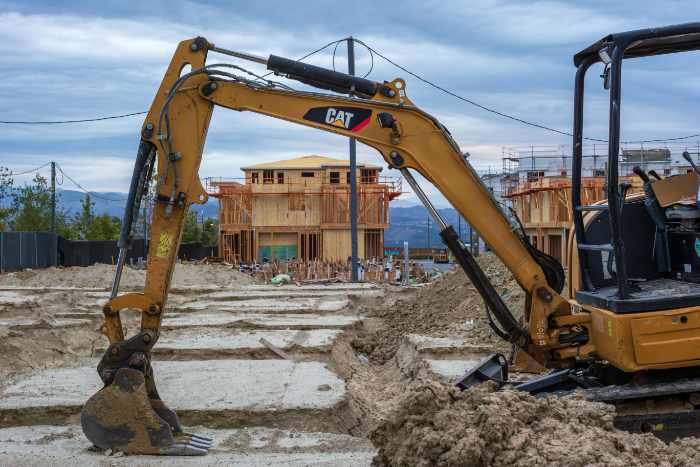The construction industry is vast and complex, relying on numerous specialists to bring a project to life. One crucial aspect of any construction project is excavation. This critical process involves digging, removing earth, and often shaping the terrain to prepare for building foundations or other structural components. In this article, we’ll look at the important tips for effective excavation whether for a residential or commercial property.

Essential Tips for Effective Excavation
Whether you’re working on a small residential project or a massive commercial build, understanding some basic principles of excavation can lead to successful outcomes. This article will provide an overview of the excavation process, offer insightful tips, and share best practices for anyone interested in this vital construction component.
Related: If the excavation is for a home’s basement, you may also want to read our 4-Step Guide to Basement Waterproofing.
Understanding the Basics of Excavation
Excavation is typically one of the first steps in the construction process, setting the groundwork for everything that follows. It involves removing earth to create space for new structures. The process can include trenching, digging out building foundations, and even adjusting terrain elevations.
Key Steps in Excavation:
- Site Evaluation
Before breaking ground, a thorough site evaluation is conducted. This step involves assessing the terrain and soil composition, which can affect the stability and safety of the excavation. Knowing these factors helps in planning and determining the appropriate equipment and techniques. - Planning and Design
Proper planning is essential for any successful project. This includes creating detailed site plans that include exact measurements and the location of essential structures. Accurate planning prevents unexpected issues during excavation. - Permitting and Regulations
It’s imperative to comply with local building codes and regulations. This involves acquiring the necessary permits before beginning any work. This step ensures safety and legality, avoiding potential fines or project delays. - Removal of Obstacles
To access the earth, debris, existing structures, and vegetation must be cleared. This step prepares the site for precise excavation work. - Excavating the Site
With the site ready, digging begins. Skilled operators use a variety of machines such as bulldozers, backhoes, and excavators to achieve the desired depth and dimensions. Attention to detail is crucial during this stage to ensure all subsequent construction aligns with design plans.
Choosing the Right Excavation Techniques
Choosing the right technique is at the top of our list of key tips for effective excavation. The method chosen for excavation depends largely on the project requirements and earth materials involved. Here are some common techniques used:
- Trenching is primarily used for laying pipelines, cables, or drainage. It involves creating narrow channels across the terrain.
- Cut and Fill involves cutting away high areas and filling low-lying regions to create a leveled surface.
- Basement Excavation requires precision and skill, as it often involves removing large volumes of earth from tight spaces.
- Dredging is applied in water environments to deepen waterways. Although less common on dry land, this technique is crucial for structures involving water bodies.
Important Considerations:
- Soil Types
Different soils exhibit varying properties. Sandy soils are easier to dig but may require shoring to prevent cave-ins. Clayey soils are stable but can become sticky when wet, affecting operations. - Water Table Levels
High water tables may necessitate dewatering techniques to ensure excavation safety and efficiency. Pumping and temporary drainage are often employed.
Expert Tips for Successful Excavation
- Select Quality Equipment
Choosing the right machinery for your project is vital. Larger, more powerful machines are essential for extensive excavations or those requiring significant depth. - Hire Skilled Personnel
A skilled excavation contractor can make all the difference. Properly trained operators ensure safe, efficient work and mitigate the risk of costly errors. - Consider Safety First
Excavation sites can be dangerous. Implement safety protocols such as protective gear, site barriers, and regular safety audits to keep workers safe. - Monitor Weather Conditions
Weather greatly impacts excavation work. Rain can cause delays, and extreme temperatures might affect machinery. Planning according to forecast conditions can prevent unwanted disruptions. - Prioritize Communication
Effective communication within the team and with stakeholders is crucial. Regular updates ensure everyone is aligned, helping to prevent misunderstandings.
Real-World Challenges in Excavation
Excavation projects are challenging and can present unexpected issues. You might encounter large underground rocks or unstable soil conditions, requiring rapid adaptation. The potential for encountering hidden utilities like gas lines or electrical cables is high. Utilizing modern technology like ground-penetrating radar can be a game-changer in anticipating these challenges.
Adapting to Unexpected Events:
- Continual Assessment
Regular monitoring of the excavation site helps in the early identification of problems. Swift decisions minimize project impact. - Emergency Preparedness
Establish a plan for unexpected events like equipment failure or severe weather to ensure safety and minimize downtime.
Bringing It All Together
Excavation is more than just moving dirt—it is a foundational aspect of construction that requires precision, planning, and expertise. By understanding the processes involved, selecting the right techniques and equipment, and emphasizing safety and communication, successful excavation can set the stage for the remainder of your construction project.
With these insights and tips for effective excavation, anyone involved in a construction project can better appreciate and execute this essential phase. Whether working on a small residential foundation or a major urban development, the principles of effective excavation remain a key determinant of success.



